Search
Showing 10 of 1193 results for Value-priced treatments https://simplemedrx.top
-
Indian students look to Kiwi universities
The third round of the New Zealand Excellence Awards (NZEA) was announced earlier this month at a student and media event, with John Laxon, ENZ Regional Director for SSEA and actress Kriti Sanon, ENZ’s Brand Ambassador for India, on hand to present.
This round of NZEA is the biggest yet, with 34 scholarships together valued at $215,000 NZD. The scholarships are jointly funded by ENZ and all eight New Zealand universities, offering deserving Indian students partial scholarships to study at New Zealand universities.
On the back of the awards, ENZ also partnered with Universities New Zealand to launch the New Zealand Master’s campaign in India, promoting industry-linked 18-month taught Master’s qualifications for Indian students, with flexible options to suit a student’s career trajectory.
A dedicated microsite to help students explore options is now live.
ENZ’s Country Manager for India, Jugnu Roy, says both initiatives show there’s a growing interest among Indian students for tertiary qualifications in New Zealand universities.
“In particular, they are drawn to the flexible nature of the way New Zealand courses are structured and the fact that all our universities rank in top 3% of the world globally (QS world rankings).
“That they can access these ‘Future-proof’ programmes that help prepare students to enter the global marketplace is what makes us stand out as a study destination compared to other countries.
“Both of our announcements were well received by students and media – ENZ’s scholarship team saw a surge of high quality applications coming in for the 2018/19 round of NZEA.”
To amplify both announcements, ENZ and some New Zealand universities are organising a Counsellor Training Webinar later in the month to equip agents to help promote these initiatives to prospective students.
-
Keynote speakers pose challenges
Unconscious bias, new models of collaboration and poetry readings in fish and chip shops are just some of the subjects examined by NZIEC’s three dynamic keynote speakers.
Guy Ryan
Imagine if every New Zealander unleashed their potential to change the world.
That’s the bold vision of Guy Ryan, founder and CEO of the charity Inspiring Stories.
Guy called on the audience to reimagine education by:
- Discovering new models of learning and collaboration.
- Creating powerful experiences and building degrees and qualifications around them.
- Harnessing technology and having content delivered by world-class people here and overseas.
- Fostering connectivity and partnerships, and thinking more about global opportunities.
New Zealand is capable of meeting challenges, says Guy, because we are “the tiny nation that can”.
Dr Lisa Coleman
Dr Coleman is Senior Vice President for Global Inclusion and Strategic Innovation and Chief Diversity Officer of New York University.
She challenged the audience’s thinking with questions such as:
- How are Millennials and Generation Z students asking us to think differently about inclusion, diversity and belonging?
- How might unconscious bias manifest itself the same or differently in individuals and organisations? (Take a test to determine your individual unconscious bias at Project Implicit)
- When trying to change an organisation on an issue such as diversity, people at the top and the bottom are often supportive but messages may get lost in the middle. How do we engage the “messy middle”?
- How we do ensure both partners in global partnerships are on an equal footing, rather than having one leading the other?
Professor Chris Gallavin
Soon to embark on a poetry tour of the nation’s fish and chip shops, Professor Chris Gallavin is both a poet and Deputy Pro Vice-Chancellor of the College of Humanities and Social Sciences at Massey University.
He told the audience that education should not be about passing on information, but about “learning how to do things with the stuff we know”.
Professor Gallavin called for a more collaborative future, with education providers engaging with industry, politics and broader society to help solve the world’s problems.
“The revolution is coming, whether we like it or not, and it will be driven by young people,” he says.
“Universities need to change our view of how we see ourselves in the world, from bastions of knowledge to centres of collaboration.”
-
Spotlight on Japan
When young Japanese student and talented rugby player Megumi came to New Zealand for six weeks to learn English in 2018, she loved it so much she decided to stay.
Her welcoming host family and peers were a large part of why she chose to make the move – on top of the chance to play rugby four times a week and learn at a high-quality secondary school.
Megumi is just one of the over 9,000 Japanese who come to New Zealand annually to study.
In fact, Japan is the third largest source country for New Zealand’s international education sector.
“New Zealand really values its education relationship with Japan, which stretches back over 60 years,” ENZ General Manager International, Lisa Futschek, says. “It’s economically important, but it also helps to enrich our young people’s lives and maintain strong cultural and people-to-people ties.”
The number of Japanese students coming here to study has grown steadily since 2013, and looks likely to increase as a number of Japanese government policies centred on internationalisation take effect.
ENZ Senior Market Development Manager for Japan, Misa Kitaoka, says 688 people visited the 2019 ENZ Fair, held in September; an all-time high and up from 500 visitors in 2018.
“I noticed significantly more parents with young children were present at the fair and this is likely driven by the fact that English will become a compulsory subject for primary-schoolers in Japan next year from 2020,” she says.

While the market demand has traditionally been focused on short-term programmes (less than three months), Misa also saw increasing interest in the long-term studies among the visitors. Given the Japanese government’s internationalisation agenda, Japanese universities are increasingly adopting the Admission Office (AO) method of assessing applicants. This means there is less emphasis on Japan’s university entrance exam held once a year, allowing those students who return from New Zealand with NCEA certification to more easily apply to Japanese universities.
Scholarships are also playing a part in generating interest in New Zealand. The Japanese government also support a series of scholarships. The Japan Student Services Organisation (JASSO), for example, offers monetary awards for both inbound and outbound students studying at tertiary level. The TOBITATE (“leap for tomorrow” in Japanese) Study Abroad initiative administered by the Ministry of Education, Culture, Sports, Science and Technology (MEXT) also provides scholarships for both school and tertiary students to study overseas.
What do Japanese students love about New Zealand?
Most Japanese students travel to New Zealand to study at secondary school level.
The opportunity to learn English in a safe and supportive environment is attractive to many Japanese learners, as is the chance to visit a country that is almost as rugby-mad as Japan. Programmes such as Game On English leverage both interests, bringing students here to both learn English and play sport at the same time.
New Zealand’s unique style of teaching is also a major attraction for prospective Japanese students and their parents. From primary school on, Kiwi students are encouraged to work collaboratively with digital devices, which develops the “21st century skills” promoted by the Japanese government and outlined in a report published by the World Economic Forum. Additionally, Japanese students coming to New Zealand will experience this learning environment in an inclusive and diverse environment with many different cultures.
Many Japanese alumni report that the Māori culture made a big impact on their time in New Zealand. Research released by the Asia New Zealand Foundation in September this year, New Zealand and Japan: To Our Future, identified Japan as the Asian country that held the most culturally similar views and values to Māori culture.
“The importance Japanese people place on reciprocity and hospitality resonates with values like manaakitanga and kaitiakitanga. Both cultures emphasise respect for elders, take a long-term perspective and stress personal relationships underpinning business dealings.”
2019 Rugby World Cup
Education New Zealand, alongside other NZ Inc agencies, have concentrated efforts on raising New Zealand’s profile in Japan during the Rugby World Cup 2019.
New Zealand and Japan: To Our Future found that many Japanese have a limited view of New Zealand. New Zealand was seen as being safe, clean and green, but also a little unsophisticated and not as technologically advanced as Japan.
Tourism New Zealand led the hosting of a pop-up event with support from ENZ last month.
Prime Minister Jacinda Ardern attended and posed for pictures with former All Blacks captain Richie McCaw and international alumni.
ENZ’s Misa Kitaoka says cross-agency collaboration like this is one of the most effective ways to increase awareness of New Zealand among the Japanese public.
“As destination marketing plays a key role for us, I hope to leverage high-profile NZ Inc activities and ministerial visits.”
-
New Zealand continues to protect and care for international students during lockdown
Providers, host families and supporting networks have been setting up additional support for international students to ensure they feel connected and safe.
Education New Zealand is pulling together some of the great things that have been taking place across the sector. Here are just a small number that we have heard about so far.
- Otago University has a dedicated information page for students, with students registering with Ask Otago. They can then request daily phone calls to check in and see how they are doing. University recreation centre staff are also offering virtual fitness classes.
- University of Auckland has been supporting the COVID-19 response by undertaking modelling work that informs the Prime Minister’s Chief Science Advisor and working directly with the Auckland District Health Board to help with testing capacity by using their facilities and people.
- Rotorua English Language Academy (RELA) is teaching online classes to 30 students from nine different countries. Many students are worried about their families back home so in addition to support during class time, staff make individual phone calls and arrange fun activities such as the recent Easter video competition on WhatsApp. Friday full-school assemblies and farewell speeches continue to lift students’ spirits with the RELA tradition of singing ‘Now is the Hour’ – managed by the school’s director playing on the piano at home while students sing over Zoom.
- Several Northland schools have been working closely with Study Northland to support the 150 international students in their care. The international students are being well supported by their schools and homestay families by keeping them busy and making them feel like an integral part of the family.
- SIEBA is doing an amazing job supporting the school sector. The small SIEBA team has been working around the clock to provide advice and guidance to schools, including publishing residential care emergency guidance to help schools navigate these tricky areas. On top of all that, SIEBA is raising key issues with the Ministry of Education and alerting government agencies to emerging challenges.
- Massey University’s international support staff are running virtual one-on-one support sessions which can be arranged by the students themselves. The university, like other universities, is making personal phone calls to all students to ensure they feel supported. Massey also has a range of wellbeing resources available and the recreation centres have taken their services online.
- Aspire2 International has launched a number of online learning solutions that have all gained NZQA accreditation. This means English, hospitality, IT and business students can transition from face-to-face to remote learning quickly in order to complete their qualifications.
We want to hear more about the great work the sector is doing to support international students within New Zealand both in enabling their learning but also supporting their wellbeing.
Please let us know what your organisation has been doing and we will look to share this wider. Send your stories to industryteam@enz.govt.nz.
-
Internationalisation remains a key focus for Education New Zealand
Under the inaugural funding collaboration with FAPESP, ENZ has pledged NZ $105,000 to nine research projects. Each project is led in tandem with academics from New Zealand and Brazil.
And for the 15th year, ENZ has supported the joint work of New Zealand and Chinese researchers through the Tripartite Fund. This year’s funding round provided NZ $20,000 to five projects (rather than the traditional NZ $30,000 to three) due to the ongoing COVID-19 travel restrictions.
As the Government is currently advising New Zealanders not to travel internationally, this funding was pledged on the proviso that the researchers either work together online or delay any international travel to a later date.
Internationalisation is a crucial part of the New Zealand International Education Strategy (NZIES) under all three pillars.
“Supporting and investing in international academic mobility is one unique way ENZ can contribute to this goal. We see short-term benefits, like person-to-person links and the strengthening of diplomatic relationships, as well as long-term benefits like increased trade flow,” says ENZ’s Chief Executive Grant McPherson.
Building international links between institutions can also directly impact their rankings. Times Higher Education recently released their Latin America University Rankings 2020, which featured seven Brazilian universities in the top 10. The Times Higher Education’s methodology includes five factors – learning environment, research, citations, international outlooks and industry income – all of which can be positively impacted by initiatives like the NZ-FAPESP funding and Tripartite Fund.
“Internationalisation is all about building and maintaining relationships. I am very proud that ENZ has not only managed to sustain this crucial link with China, but built new connections with Brazil.”
Over the history of the Tripartite Fund, we’ve seen positive outcomes across a variety of research areas including environmental protection and climate change, health and medicine, animal science, educational development, media literacy, renewable energy and the conservation and heritage of national parks. The partnership with FAPESP also started with relevant areas for New Zealand, like education, engineering, biological sciences and health.
It’s a mark of the high-quality and reputation of New Zealand’s universities’ that they all are able to enter in the Tripartite Fund and arrangements like the one with FAPESP.
-
LINK Symposium connects academics
The second iteration of the LINK Symposium was held on 27 and 28 November. It was originally slated to take place in São Paulo, but was moved online in response to COVID-19.
LINK invited art and design practitioners to be inspired by research methodologies that centre their practice. Presenters demonstrated the potential of their practical frameworks in a range of design topics, including emergent design, design education, and Pacific-Atlantic design.
AUT Programme Leader for Communication Design, Prof Marcos Mortensen Steagall, said “the LINK symposium promotes opportunities for academics from Brazil and New Zealand not only to expand their knowledge about state-of-the-art practice-oriented methodologies in design research, but also to establish networks of collaboration and partnerships. For instance, Brazil can benefit from the way New Zealand incorporates Māori knowledge in their research practices, acknowledging their native traditions.
“New Zealand can learn and benefit from top-level production practices and Brazil's over 150 million users in the gaming market. It starts with academic interests that can potentially be expanded into business opportunities.”
University Anhembi Morumbi Prof Sergio Nesteriuk, who specialises in game design with interests in animation, film and transmedia, said: “The event exceeded all our expectations both for the quantity, quality and diversity of works presented, as well as for the exchange and engagement of all participants.
“We were also honoured to have Education New Zealand's support on this issue. This allows us to project new growth for the event next year, consolidating it as one of the main ones in this area worldwide.”
ENZ Director of Education - Brazil, Ana Azevedo, spoke at the opening.
“This is a significant development for the academic relations between Brazil and New Zealand and it is very positive to see it happening in areas that are so valuable to our cultures like Art and Design.
“New Zealand and Brazil have many shared research interests, including an affinity for practice-based modes of enquiry and pedagogy. I am very pleased that the LINK Symposiums have carved out a niche for Brazilian and New Zealand academics to connect,” she said.
International academic cooperation is aligned with the goals of the IES and can bring mutual benefits to New Zealand and partners around the world, developing better solutions for common challenges. Education New Zealand has supported other international cooperation activities as the Tripartite Partnership Fund with China and the joint call for research mobility with the São Paulo Research Foundation in Brazil (FAPESP).
-
Reconnecting at ICEF ANZA 2022
Education New Zealand Manapou ki te Ao attended the conference, alongside Immigration New Zealand and Kiwi education providers.
This was the largest ICEF ANZA event in its 15-year history. Among the conference's close to 500 in-person participants were 183 education agents representing 61 countries. The top five countries represented at the conference were Colombia, India, Viet Nam, Nepal, and Brazil.Agents at the event demonstrated a particular interest in New Zealand and Australia, and they were keen to reconnect with New Zealand education providers and promote New Zealand to prospective students.
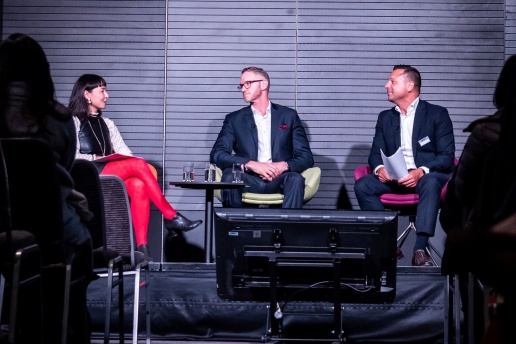
(l to r) Geneviève Rousseau Cung, ENZ's Partnerships Manager, Brett Blacker, CEO, English Australia and Martijn van de Veen, VP Business Development, ICEF during their panel discussion.
Geneviève Rousseau Cung, ENZ's Partnerships Manager, was a guest panellist during the opening plenary session 'Study Destinations: Australia and New Zealand back in the game'. ICEF have released a podcast based on this panel discussion, which you can listen to here: https://lnkd.in/d5cMpwfm
-
Building connnections with career counsellors in India
Seven of New Zealand’s universities took part in the conference, which attracted more than 1,400 delegates, representing 56 nationalities. The university delegates engaged in panel discussions on a range of topics, including ethical counselling and preparing for education abroad, which were well attended. Education New Zealand Manapou ki te Ao (ENZ) led the New Zealand delegation as a gold sponsor of the event.
Launched in 2016, IC3 is the largest platform for connecting high school career counsellors in India with tertiary education institutions. The conference brings together school leaders, teachers, counsellors, universities, education organisations, government bodies, industry leaders and others with an interest in sustainable and inclusive counselling, focused on student success.
Jugnu Roy, ENZ’s Director of Engagement based in India, says participation in the annual conference is valuable for ENZ as well as for the universities involved.
“High school careers and college counsellors are key influencers for students in India when it comes to making choices about tertiary study and future careers. This event has been a great help with building our connections with schools across southern India, so we can develop a pipeline of international students interested in undergraduate study in New Zealand.
“The timing of the conference worked well as an opportunity for branding, visibility, and reconnecting with Indian schools soon after the opening of New Zealand’s borders. This was the first time we had been able to attend in person for two years.
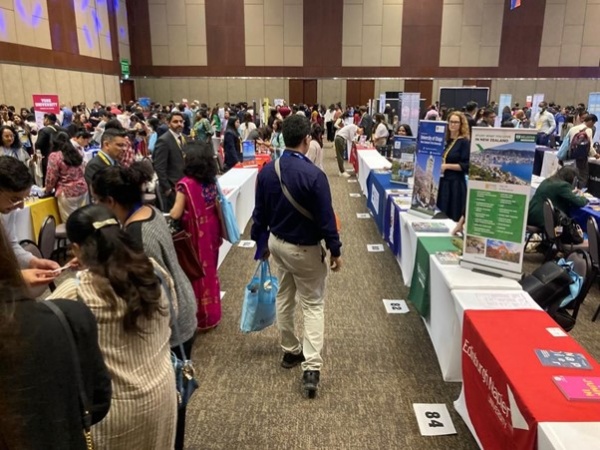
New Zealand universities interacting with schools at the networking session.
“Our participation in the event has already led to increased interest in a New Zealand education among high school counsellors, who are keen to invite New Zealand institutions to their schools for university fairs and to meet with students.
“In a country like India, where many countries are trying hard to attract international students, New Zealand’s presence sends a strong signal that we are committed and here to stay.”
The 2022 IC3 Institute Student Quest Survey Report was published during the conference. More than 10,000 students responded, naming the top three factors affecting their choice of university: programme details, financial aid/scholarship information, and potential job opportunities.
For more information about the conference, see the IC3 Conference website here.
For more information about the recent student survey, see the IC3 Institute website here
-
Prime Minister’s Scholarships to study in Asia and Latin America announced
Education New Zealand Manapou ki te Ao (ENZ) Chief Executive Grant McPherson, today announced the names of 111 New Zealanders who will travel to destinations in Latin America and Asia for an international education experience on a Prime Minister’s Scholarship for Asia (PMSA) or Latin America (PMSLA).
Funds awarded for individuals in this scholarship round total $1.5 million.
The individual recipients are the second round of scholarships to be announced this year. The earlier round of scholarships was awarded to groups.The recipients will undertake study, research and internship programmes in fields such as business, language, indigenous rights, sustainable development and architecture for a minimum period of four weeks (Latin America) and six weeks (Asia) up to two years. The top Latin America study destinations for this round are Chile and Colombia, with Japan and the Republic of Korea most popular destinations in Asia among scholars.
“The merit of our scholarship applicants continues to be impressive – we are proud to offer this opportunity for people to develop their inter-cultural skills, build networks and enjoy experiences abroad,” said McPherson. “We know they will make us proud to have them representing New Zealand in this important time of rebuilding and reconnecting with overseas partners.”
“Interest for this programme continues to grow, building collective skills and understanding of different cultures helps our country show leadership in matters of significance for Asia and Latin America regions.”
Māori Participation lifts significantly
A group of Māori Prime Minister’s Scholarship alumni, Te Kāhui Kaupapa, have been working to raise access and participation for Māori. Participation in this round increased to 22% for PMSA and 17% of PMSLA recipients, compared to an average of 5% for PMSA and 8% for PMSLA rounds in 2016 to 2019. This is part of a wider programme of work to ensure the scholarship programme is more accessible to all New Zealanders over the age of 18, and that it delivers on our Te Tiriti obligations.
The Prime Minister’s Scholarship programme aims to strengthen New Zealand’s ability to engage with key Asian and Latin American trading partners, improving the internationalisation of indigenous communities, New Zealand tertiary institutions, showcasing the strength and quality of New Zealand's education system and enhancing inter-cultural awareness and connections between New Zealand and other countries. The scholarship offers flexible funding to support both short and long-term programmes including study abroad / exchange, internships, postgraduate study, and language programmes.
The scholarships programme is funded by the New Zealand Government and administered by ENZ.
The PMSA was launched in 2013 and extended to Latin America in 2016. To date, there have been 2,879 PMSA and PMSLA scholarships awarded.
There are two scholarship rounds each year, and applications for the next individual round will be held in August 2023. Many of the awardees are enrolled in universities across New Zealand, but this is not a requirement for the scholarship. Any New Zealand citizen or permanent resident over 18 can apply for a PMSA or PMSLA.
More information on the application process can be found here.
A full list of this round of scholars can be found here.
-
Japanese teachers experience New Zealand’s regional schools
“Waseda University and its affiliated schools are longstanding and valued partners for us,” says Misa Kitaoka, Director of Education in Japan for Education New Zealand Manapou ki te Ao (ENZ).
“It’s exciting to see the strong regional focus they have chosen for their students’ study in New Zealand in 2023 and hear about the planned growth of the programme.”
Waseda University schools will be sending up to 60 students on a group programme to schools in Manawatū and Hawke’s Bay for two weeks in March 2023. The two regions were selected to receive students after taking part in an Expression of Interest process. Close to 80 students have already applied to take part, and Waseda plans to increase the number of participants to 100 from 2024, and to increase the length of their visit in future years.
ENZ hosted the familiarisation tour (famil) to Manawatū and Hawke’s Bay from 21- 25 November 2022. Four Tokyo schools took part alongside Waseda University: Waseda University Senior High School, Waseda University Honjo Senior High School, Waseda Jitsugyo High School and Waseda Saga Junior and Senior High School. The famil was co-funded by ENZ and Air New Zealand, and Palmerston North City Council and Learning Hawkes Bay played a major role in helping to organise visits to 14 different education providers.
“Through the five-day famil, our regional and institutional partners demonstrated their strengths and uniqueness,” says ENZ’s Director Marketing and Strategies, Patrick Holden, who travelled with the delegation.
“Delegates commented on how welcome they felt and how impressed they were to see indigenous Māori language and customs being incorporated into the school curriculum. The manaakitanga shown by the different institutions was well received, especially the pōwhiri.”
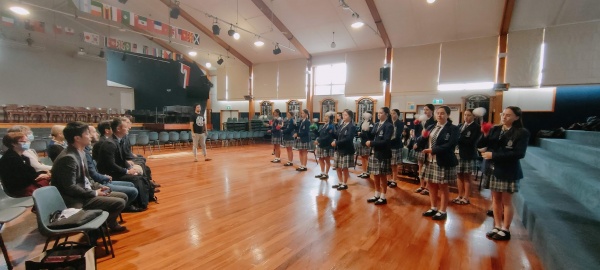
The delegation is welcomed with a powhiri at Napier Girls High School
Misa Kitaoka stressed the importance of destination marketing with support from regional partners.
“While decision-making tends to be institution-led in the tertiary sector, decisions for the school sector are often led by the region or city. This famil was a great opportunity for us to showcase the regions first, followed by the education offerings available in the regions.
“Japanese school students, parents and educators are also interested in cultural experiences in New Zealand beyond education, including the opportunities to interact with local students and host families, and to embrace New Zealand’s cultural values of diversity and inclusion.
“While video-calling offers many benefits and has been vital across the pandemic, bringing famils back into the country means our offshore stakeholders can experience first-hand what New Zealand has to offer. Regional involvement will play a key role in building long-term reciprocal relationships for Aotearoa.”
For more on ENZ’s education partnership with Waseda University and its affiliated schools, please click here.
For more on the value of short-term programmes for international students in New Zealand and the potential benefits to New Zealand and the educator sector, check out this recent Spinoff article: How educational exchange fosters more than just learning | The Spinoff
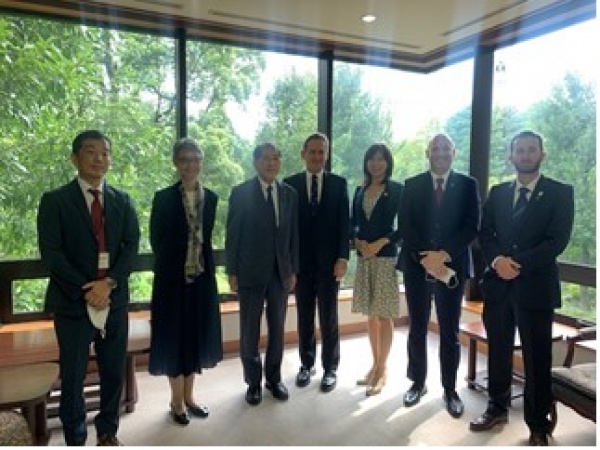
Hamish Cooper, NZ Ambassador to Japan, and ENZ staff Misa Kitaoka, Patrick Holden and Ben Burrowes called on the President of Waseda University, Dr Aiji Tanaka and Prof. Kate Elwood, Dean of Centre for International Education recently to congratulate Dr Tanaka on his reelection as the 18th President of Waseda University
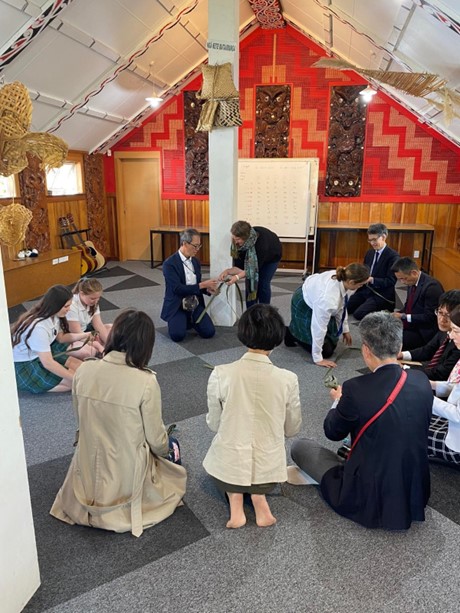
The delegation was welcomed on to the Central Hawkes Bay College Marae where they were given background about the history of the marae and given a quick fire class in flax weaving
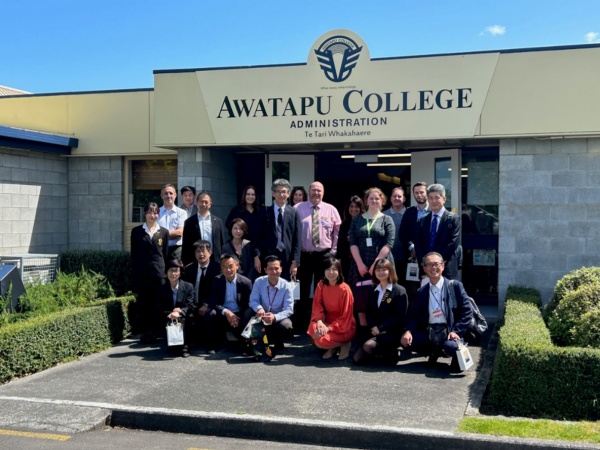
Waseda delegation outside Awatapu College

